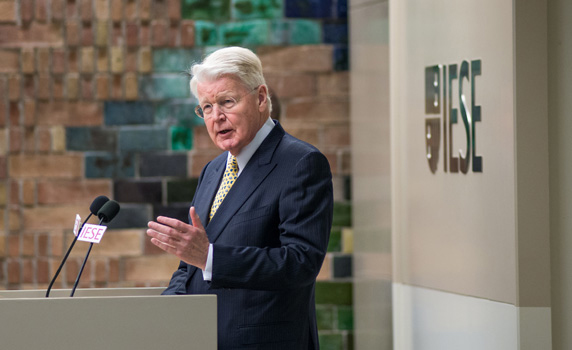
"A modern economy is not built on relationships between companies and financial institutions; it’s built on its community of people."
This was the message shared by Iceland’s President Ólafur Ragnar Grímsson with a packed auditorium on IESE’s Barcelona campus this week.
"Because our policies are focused on giving people more confidence, our people have found a way to move forward. Democracy is a powerful economic force in itself. And a successful economy is about people."
Grímsson has held the presidency since 1996. He oversaw the privatization of Iceland’s financial sector at the start of the 21st century; and its sudden collapse in 2008. At that time, Iceland was the first nation to succumb to the crisis; a meltdown that wiped out 50,000 people’s savings, plunging Icelanders into debt and putting 25 percent of homeowners into mortgage default.
Following the crisis, Grímsson’s government eschewed the prevailing economic orthodoxies of Brussels, Washington and the IMF. Instead, Iceland became what he calls an "experiment" in doing things differently.
Response to the Crisis
Refusing to pump money into its ailing financial sector, Grímsson’s administration opted to let three giant banks fail – a decision seen as controversial at the time. His government also introduced currency controls and pursued a vigorous policy of employment creation, bringing together educational institutions and the private sector with backing from the state. This, together with sustained investment in green energy and environmentally sustainable development has, says Grímsson, provided the impetus for Iceland’s showcase economic recovery.
While the crisis continues to make headlines around Europe, Iceland’s fortunes have been dramatically reversed. Though the road to recovery has not been without its "unpleasant challenges."
The Long Road to Recovery
Iceland has long enjoyed a reputation for security and democracy, said Grímsson. With a thousand-year-old parliament, no armed forces and an unarmed police force, the country suddenly found itself grappling with civil disobedience and rioting in the streets. "What I feared most in 2008 was whether we would survive as a democracy. My generation faced a conflict we never thought we’d have to solve – between free capital and the financial markets and the democratic foundations of our society," Grimsson said.
"The first lesson we learned from the crisis was that the ideology that prosperity was linked to giving financial institutions the greatest freedom possible – that this was flawed. And that these institutions and the market, far from carrying no democratic or social responsibility, actually carried a great deal."
Iceland found itself isolated, with the European Union unanimously against the decision to let its banks fail. "There were powerful forces in Iceland and Europe that thought my decision was absolutely crazy. But why can’t banks be allowed to fail when other big companies critical to the economy are allowed to go bankrupt? I have never understood the argument – why is the financial sector somehow better for the well-being and future of an economy than the industrial, creative, or manufacturing sectors?"
Rejecting Austerity
Grímsson also explained why the country had refused to adopt austerity measures and opted instead to bring educational institutions and employers together to avoid mass unemployment.
"You can’t make an economy recover by making people suffer – I believe it is intellectually, economically and politically wrong," he said.
Iceland today is not without its problems: Taxes and living costs are high, wages remain low and many Icelanders remain trapped in negative equity, or owing more than they originally borrowed in index-linked mortgages.
But the country is in the midst of a tourism boom, with visitor numbers rising between 15 and 20 percent every year. Its tech industry is thriving; the result, according to Grímsson, of math and engineering talent released by the banking industry finding a new outlet. Rio Tinto chose the country to make its first major post-crisis investment, a $487-million bet on the benefits of Iceland’s ability to generate cheap, green energy from hydroelectric plants and thermal springs. Unemployment is under 5 percent and many educated young Icelanders who left the country when the crisis hit are now coming home.
"When you trust democracy and allow people to make decisions about the future, they feel invested in that future," said Grímsson.